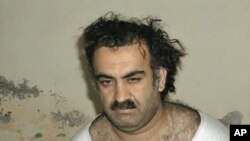2011 will mark 10 years since the September 11, 2001 attacks on the United States. While the alleged mastermind, Khalid Sheikh Mohammed, is in U.S. custody, it is not clear when and where he will be tried. One of the reasons is continued controversy over which court system, civilian or military, should be used to bring terrorism suspects to justice. Some of the terrorism trials held so far have not settled the issue.
In January, New York Mayor Michael Bloomberg reversed his earlier support for a decision by the Obama Administration to try alleged 9/11 conspirators in the city's federal civilian court. Bloomberg said such trials would cost the city hundreds of millions of dollars in added security costs.
"There are places that would be less expensive for the taxpayers and less disruptive to New York City. For example, military bases away from central cities where it's easier to provide security at much less cost."
Republican members of Congress have been particularly critical of civilian terror trials, accusing the Obama administration of treating accused terrorists lightly by not seeking justice in military courts. Alabama Republican Senator Jeff Sessions: "Civilian trials for terrorist combatants are not required by law, policy, history, treaty or plain justice. Yet this policy it appears still remains in effect or at least unsettled."
Attorney General Eric Holder has indicated the issue is indeed unsettled. "No final decision has been made about the forum in which Khalid Sheikh Mohammad and his co-defendants will be tried. As I said from the outset this is a very close call. It should be clear to everyone by now there are many legal, national security and practical factors that have to be considered here."
There have been no security breaches at any of the civilian terror trials that have taken place so far. The civilian approach to such cases appeared vindicated when a jury of New Yorkers found Pakistani neuroscientist Asfia Saddiqui guilty in September of shooting at FBI agents and soldiers after her arrest in Afghanistan. She was given an 86-year prison sentence. Two months later, though, jurors in the same court house acquitted accused terrorist Ahmed Ghailani of all but one of 285 counts against him in connection with the 1998 bombings of U.S. embassies in Kenya and his native Tanzania.
Columbia University Associate Law Professor Matthew Waxman said military tribunal convictions can be overturned on appeal, just like those in a civilian court. And he said sentencing in such tribunals is not necessarily stricter.
"We've certainly seen many civilian trials go to judgment in terrorism cases and impose very stiff sentences on terrorism suspects. And we've seen military commissions that have resulted in relatively short sentences," said Waxman.
As an example, Waxman points to the radical difference between the nine-month suspended sentence handed to Australian David Hicks by a U.S. military tribunal, and the 20-year sentence given to the so-called American Taliban, John Walker Lindh, by a civilian court. Both were arrested in Afghanistan, where they had joined the Taliban. A military tribunal also gave a five-and one-half-year sentence to Salim Ahmed Hamdan, a body guard and driver of al-Qaida leader Osama bin Laden - while Ahmed Ghailani faces a minimum 20-year sentence in a civilian court.
Meanwhile, there is no decision on when and where to try Khalid Sheikh Mohammed. It's also possible, in fact, that he will be held indefinitely as an enemy combatant at the U.S. military detention center in Guantanamo Bay, Cuba. Lower-level suspects, at the same time, may continue to face justice in civilian courts.




